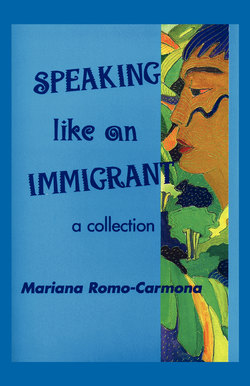Читать книгу Speaking Like An Immigrant - Mariana Romo-Carmona - Страница 2
На сайте Литреса книга снята с продажи.
ОглавлениеPreface To The Second Edition
In 1999 this small book was printed, boxed, shipped here and there in a hopscotch journey of presentations and readings from New York City to Toronto, shelved in the last remaining independent bookstores of the twentieth century, and eventually spent many years stacked in a slowly dwindling edifice of boxes as it sold or was given away. Very slowly.
The stories gathered in Speaking Like An Immigrant represent so many things that it was a book that failed to make a direct hit. It was not radical enough in a community already radicalized by our own activist work, and too subtle at a time when we had grown too sophisticated for this simple collection. The book was supported by the award of an Astraea Lesbian Fiction prize in the first year of its creation, in 1991 when, for the first time in my life as a writer, I was able to take time off just to write. Instead, I used the time the award had given me to continue much of the political work I had been doing for fifteen years, and would carry on for the next ten. The groundbreaking monthly zine, COLORLife! was one of the fruits of this work, as was the creation of the People of Color Lesbian Gay Bisexual Two-Spirit Steering Committee that sponsored the first POC contingent at the New York City Pride March, and my participation as Keynote Speaker at the 1992 Outwrite Lesbian & Gay Writers Conference held in Boston that year. The first draft of my first novel, Living At Night was written during that time. The shape for this collection that I envisioned being titled, “Welcome To America” finally emerged and landed in a file folder. It was 1992, the year of the Quincentennial.
Collectively, I think in those days we were also witnessing the aftermath of the first Iraq war, perhaps the most disgraceful and horrific hostile action by the US until then, and the entire world seemed to wake up to what an empire can do, given enough fire power and five hundred years. I understood that what I often found myself writing about had to do with the significance of the quincentenary age that changed an entire continent, but I could not express, not adequately, the pain and the fragmentation of our history as Latin/Americans. I only knew, as a writer of small moments, of small truths, that these are every bit as relevant today as they were the day before and the day before that. What I could write, was about a personal process of shifting from one language to another, the creation of an immigrant culture, identity found in words, a small metaphor for existentialist angst of the political kind.
This second edition has been re-edited and expanded, with the stories now organized in chronological order. Following the title story, “Speaking Like An Immigrant,” written in 1996 after my return to Chile after 30 years, we jump back to “Dream of Something Lost,” 1978, “Cuento de Jalohuín,” from 1979, and move forward to 2005, with “Passage.” Two stories, “La virgen en el desierto,” and “Gabriela,” are now in the original Spanish, while “Idylls of a Girl,” a story written in English from the perspective of Memory, a disembodied narrative voice, is so much a product of the topography of 1950s Santiago, Chile, that it now has my translation into Spanish as a subsection.
Similarly, “The Foreign Girl,” a memoir that appeared in Clifford Chase’s anthology, Queer 13: Lesbian & Gay Writers Recall 7th Grade as “How We get That Way,” has been added as a subsection to the fictional “Kissing Susana.” The last entry, “This Is What We Say,” is an excerpt of my novel in Spanish, Lo que queda en la memoria, that began as a translation into English in 2006 and grew into a fitting piece to close the collection. I hope that the publication of this 20th Century “manuscript” as an e-book, finally makes more sense in the 21st. Mariana Romo-Carmona, November 6, 2010 New York City
Publication Acknowlegments
Publication Acknowledgments
Grateful acknowledgment is made to the editors of the publications in which the following stories originally appeared: “Fear,” published as “Untitled” in Fight Back! Feminist Resistance to Male Violence, Cleis Press, 1981. “Gabriela,” original in Spanish, Compañeras: Latina Lesbians, 1987, 1994. “Gabriela,” English translation by the author, Conditions: 15, 1988. “La virgen en el desierto,” Cuentos: Stories By Latinas, 1983. “The Virgin in the Desert,” English translation by the author, Beyond Gender and Geography: American Women Writers, 1994. “2280,” Conditions 17, 1990. “Orphans,” The Portable Lower East Side: Queer City, 1992. “The Web,” COLORLife Magazine, 1994. “Speaking Like An Immigrant,” published as “Meditations on Immigration,” Front: Vancouver ArtsMagazine, 1996. “Idilio,” Las amantes de la luna, Mexico City. “The Foreign Girl,” published as “How We Get That Way” in Queer 13: Lesbian & Gay Writers Recall Seventh Grade, appeared excerpted in Essence Magazine, October 1999. “Tracks,” Carve Magazine, 2003; “Passage,” STEEPED: In The World of Tea, Interlink Books, 2005.
